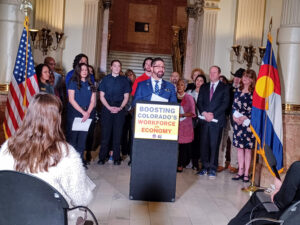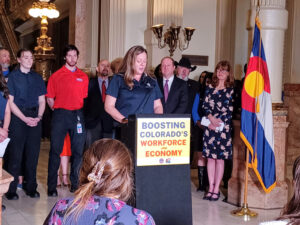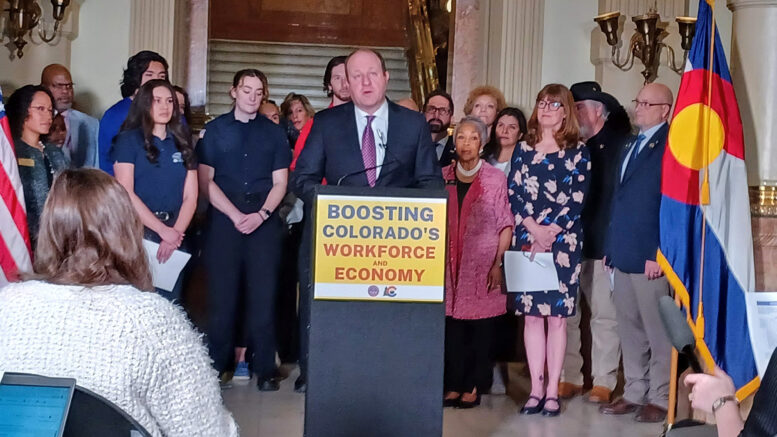Seeking to alleviate the labor shortage that continues to plague multiple industries, Gov. Jared Polis and a bipartisan group of legislators announced Tuesday that they will run two bills that could put $70 million toward helping students get credentials in high-demand fields.
One effort would spend about $45 million on paying for students to get degrees and certificates in sectors critically short on workers, including construction trades, nursing, elementary and early-childhood education, firefighting, law enforcement and forest management. The other would spend about $25 million on offering $1,500 to as many students as possible who are graduating from high school in spring 2024 for use on degrees, apprenticeships, certificates and on-the-job training opportunities.
The totals, which are still being negotiated as legislators deal with a budget that is expected to be tight, are enough that they could help to make inroads at a time when unemployment has dropped to a pre-pandemic level of 2.8% and there remain two job openings for each person looking for work, supporters said.
Officials speaking at news conference at the Capitol did not offer estimates of how many Coloradans they expect to benefit from the allocation, though House Speaker Julie McCluskie at one point said she thinks they can put 3,000 more people into construction apprenticeships. But both bills, coming one year after the Legislature seeded a credential-fee-covering bill for health-care professionals that’s benefitted 1,403 students, are expected to produce a talent pipeline quickly, as many of the priority fields do not require four- or even two-year degrees.
“I think for every one of us, when we’re working in our communities … what we hear from our businesses — across businesses small and large — is we need people to fill these job openings,” Polis said. “And we hear from residents: ‘I want to get this job, but I don’t have the skills.’ And we want to match those two things.”
Meant to produce workers quickly
The proposal for the universal scholarship program would distribute money to students graduating next year to use on tuition, fees and books, with a goal to get funding in the hands of about 25% of the graduating class, said Eve Lieberman, executive director of the Colorado Office of Economic Development and International Trade. The money would be prioritized for students going into high-demand careers — co-sponsoring Rep. Matthew Martinez of Monte Vista identified health care, manufacturing, education and construction as some of those careers — but could be used by students in any career field if enough is available.

Colorado state Rep. Matthew Martinez, D-Monte Vista, talks Tuesday about a workforce-development bill that he plans to sponsor.
The zero-cost credentialing bill, which is expected to be introduced soon, would direct much of its resources toward certificate and associate degree programs at community colleges, local district colleges and area technical colleges. But it also would fund expansion of short-term programs at community colleges and distribute money to registered apprenticeship programs in the building and construction trades via competitive grants.
A focus on construction
Mike Gifford, president and CEO of Associated General Contractors Colorado, said in an interview that the 185,000 Coloradans now working in construction trades are about 35,000 short of the number needed, particularly as demand rises for more homebuilding. But that number is expected to grow, as an older generation of construction workers is beginning to age out of the field, leaving it even more difficult to meet populations demands and ease the shortage of affordable housing, he noted.
While most apprenticeships already are cost-free, putting an expected $1.4 million toward them can allow program operators to offer things like books and other materials for free as well, reducing barriers to access for lower-income individuals, Gifford said. And it could allow registered programs to expand into new pieces of equipment or new areas of focus, such as a construction-superintendent program that AGC is hoping to get U.S. Department of Labor approval to launch, that can allow trade groups to serve even more people and make the sector more attractive to those who are leaving school.
“In those ways, I think it might benefit the industry,” Gifford said.
While the bills themselves have bipartisan backing — several Republicans were on hand to announce they would be co-sponsoring and supporting them — their biggest issue likely will be whether they can get the full allotment of funds for which they are seeking. Legislators already have delayed the introduction of the budget bill by one week as they juggle numerous requests for limited funding for proposed new programs, causing some bills to try to seek money largely untapped funds within some departments, and the $70 million for the two programs would represent one of the bigger chunks of new money going toward one area this year.

Karen Keyes, owner of The Art of Concrete, talks Tuesday during a news conference at the Colorado Capitol on coming workforce-development bills.
Karen Keyes — owner of The Art of Concrete, a 6-year-old Denver construction company — was among those who showed up to support the announcement of the two bills, saying she believes they could help to push more people from thinking about her industry to actually getting into it. Her 29-person company is about five workers short of what she needs right now and 10 or more short of what she’ll need during the business summer season, and having construction listed as a priority industry with dedicated training funding should make some folks think harder about it as a career, she said.
“As our state continues to grow and the need for construction remains, we must find ways to get young professionals, both male and female, into this critical industry,” Keyes said.
